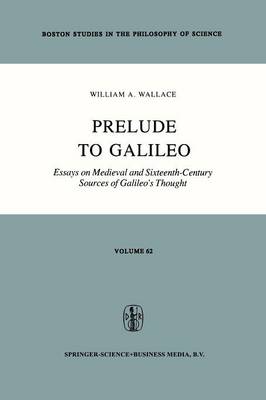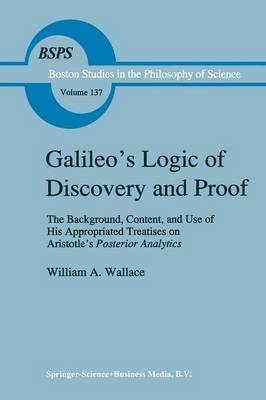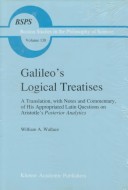Boston Studies in the Philosophy and History of Science
3 primary works
Book 62
Can it be true that Galilean studies will be without end, without conclusion, that each interpreter will find his own Galileo? William A. Wallace seems to have a historical grasp which will have to be matched by any further workers: he sees directly into Galileo's primary epoch of intellectual formation, the sixteenth century. In this volume, Wallace provides the companion to his splendid annotated translation of CaWeo's Early Notebooks: The Physical Questions (University of Notre Dame Press, 1977), pointing to the 'realist' sources, mainly unearthed by the author himself during the past two decades. Explicit controversy arises, for the issues are serious: nominalism and realism, two early rivals for the foundation of knowledge, contend at the birth of modem science, or better yet, contend in our modem efforts to understand that birth. Related to this, continuity and discontinuity, so opposed to each other, are interwoven in the interpretive writings ever since those striking works of Duhem in the first years of this century, and the later studies of Annaliese Maier, Alexandre Koyre and E. A. Moody. Historio grapher as well as philosopher, Wallace has critically supported the continuity of scientific development without abandoning the revolutionary transforma tive achievement of Galileo's labors. That continuity had its contemporary as well as developmental quality; and we note that William Wallace's Prelude studies are complementary to Maurice A. Finocchiaro's sensitive study of CaWeo and the Art of Reasoning (Boston Studies 61, 1980), wherein the actuality of rhetoric and logic comes to the fore.
Book 137
This volume is presented as a companion study to my translation of Galileo's MS 27, Galileo's Logical Treatises, which contains Galileo's appropriated questions on Aristotle's Posterior Analytics - a work only recently transcribed from the Latin autograph. Its purpose is to acquaint an English-reading audience with the teaching in those treatises. This is basically a sixteenth-century logic of discovery and of proof about which little is known in the present day, yet one that arguably guided the most significant research program of the seventeenth century. Despite its historical and systematic importance, the teaching is difficult to explain to the modern reader. Part of the problem stems from the fragmentary nature of the manuscript in which it is preserved, part from the contents of the teaching itself, which requires a considerable propadeutic for its comprehension. A word of explanation is thus required to set out the structure of the volume and to detail the editorial decisions that underlie its organization. Two major manuscript studies have advanced the cause of scholarship on Galileo within the past two decades. The first relates to Galileo's experimental activity at Padua prior to his discoveries with the telescope that led to the publication of his Sidereus nuncius in 1610. Much of this activity has been uncovered by Stillman Drake in analyses of manuscript fragments associated with the composition of Galileo's Two New Sciences, fragments now bound in a codex identified as MS 72 in the collection of Galileiana at the Biblioteca Nazionale Centrale in Florence.
Book 138
Hard as it is to believe, what is possibly Galileo's most important Latin manuscript was not transcribed for the National Edition of his works and so has remained hidden from scholars for centuries. In this volume William A. Wallace translates the logical treatises contained in that manuscript and makes them intelligible to the modern reader. He prefaces his translation with a lengthy introduction describing the contents of the manuscript, the sources from which it derives, its dating, and how it relates to Galileo's other Pisan writings. The translation is accompanied by extensive notes and commentary; these explain the text and tie it to the fuller exposition of Galileo's logical methodology in the author's companion volume, Galileo's Logic of Discovery and Proof.
The result is a research tool that is indispensable for anyone intent on understanding Galileo's logic as described in that volume and the documentary evidence on which it is based.
The result is a research tool that is indispensable for anyone intent on understanding Galileo's logic as described in that volume and the documentary evidence on which it is based.


